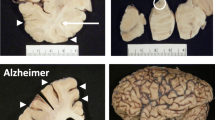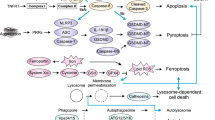Abstract.
Glycogen synthase kinase-3β (GSK-3β) is a physiological kinase for tau and is a candidate protein kinase involved in the hyperphosphorylation of tau present in paired helical filament (PHF)-tau of neurofibrillary tangles (NFT) in Alzheimer's disease (AD). GSK-3β is also a key element of several signaling cascades (including cell death cascades). We have investigated the immunocytochemical localization of GSK-3 immunoreactivity in AD. Neurons exhibiting strongly GSK-3-immunoreactive granules were observed in AD, with a much higher frequency than in control subjects. This immunoreactivity was found to co-localize with the granulovacuolar degeneration (GVD) and to be associated with the granules of the granulovacuolar bodies. The GVD granules showed a strong GSK-3α and GSK-3β immunoreactivity, and this immunoreactivity was abolished by preabsorption with recombinant GSK-3. In addition, the GVD immunoreactivity was observed with an antibody against the tyrosine-phosphorylated and active form of GSK-3. Some granules of the granulovacuolar degeneration were also intensely labeled with an antibody specific for tau isoforms containing insert 1 (exon 2) and with antibodies specific for tau phosphorylated on Ser262 and for tau phosphorylated on Thr212/Ser214, two phosphorylation sites generated in vitro by GSK-3α and β. GSK-3β was expressed in neurons containing NFT but only a small proportion of intracellular NFT were observed to be GSK-3β immunoreactive. Immunoblotting analysis of fractions enriched in PHF-tau did not reveal any GSK-3β immunoreactivity in these fractions, indicating that GSK-3β was only loosely associated to NFT. These results suggest that neurons developing GVD sequester an active, potentially deleterious, form of GSK-3 in this compartment and that increased GSK-3 immunoreactivity in a subset of neurons quantitatively differentiates normal aging from AD.
Similar content being viewed by others
Author information
Authors and Affiliations
Additional information
Revised, accepted: 21 June 2001
Electronic Publication
Rights and permissions
About this article
Cite this article
Leroy, K., Boutajangout, A., Authelet, .M. et al. The active form of glycogen synthase kinase-3β is associated with granulovacuolar degeneration in neurons in Alzheimer's disease. Acta Neuropathol 103, 91–99 (2002). https://doi.org/10.1007/s004010100435
Received:
Issue Date:
DOI: https://doi.org/10.1007/s004010100435




